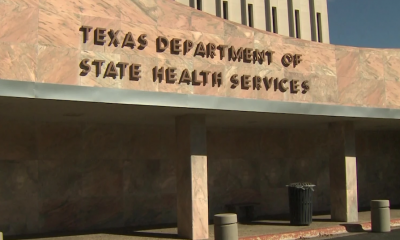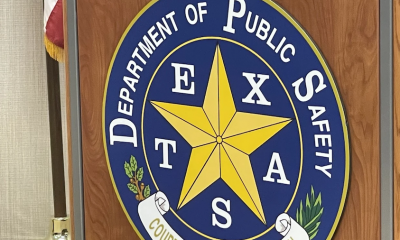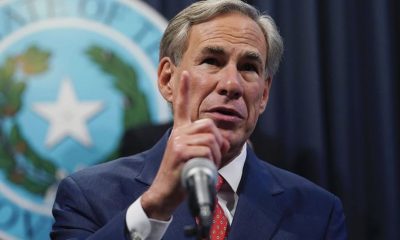Texas
Texas Comptroller Glenn Hegar on vaccines and the state’s economic recovery

TX – The state’s economic recovery is tied to the rollout of the coronavirus vaccine and how comfortable Texans feel with it, Comptroller Glenn Hegar said Thursday in a wide-ranging interview with Texas Tribune Executive Editor Ross Ramsey.
As the 2021 legislative session began this week, Hegar also raised concerns Thursday about state pensions and the prospect of new revenue streams. Lawmakers will have through May to address these and a host of other issues with nearly $1 billion less money than they had to spend when writing the previous two-year budget during the last legislative session in 2019.
Uncertainty, Hegar emphasized, is the backdrop of his economic forecast, as the coronavirus is still spreading rapidly across Texas — and has killed more than 30,000 Texans — 10 months after it started.
Here are four key topics Hegar covered during Thursday’s interview.
Texas’ economic recovery
Hegar and economists have said since the spring that a strong economic recovery will not happen until the coronavirus recedes. Now at this stage of the pandemic, Hegar said the economic recovery “centers around the vaccine, consumer confidence” and the prospect of more federal relief after President-elect Joe Biden takes office later in January.
“As the vaccine rolls out,” Hegar said, “how effective is the rollout? How many people are taking the vaccine? What is consumer confidence as a result of the vaccine?”
These are all questions Hegar said determine the economic recovery in Texas, and Gov. Greg Abbott this week promised to ramp up the state’s vaccine rollout after a turbulent start.
More than government shutdowns, Hegar said Texans’ “concerns and fears” about the coronavirus have been the most significant drag on the economy, underscoring his and other economists’ analysis last year that the economic recovery is directly tied to the state of the coronavirus.
But the shutdowns of 2020 highlighted inequities in the economy, with the shutdowns leading certain industries to turn to working from home while workers in other industries, including hospitality, tourism and entertainment that pay workers low wages, still showed up in person if their businesses were able to remain open.
“Those that are in lower income-paying — hospitality, leisure — which is a huge part of the economy, have been disproportionately impacted by this downturn,” Hegar said. “Until that confidence and that travel and hospitality opens back up to levels seen before, that area of the economy is not able to fully recover and it’s going to take a long time, unfortunately, for those areas.”
State budget
Hegar’s biennial revenue estimate on Monday announcing that lawmakers had a roughly $1 billion deficit to spend when writing the budget this legislative session compared to last was an improvement from Hegar’s estimate over the summer. In July, Hegar said lawmakers would have a roughly $4.6 billion hole.
“They’re in as good a shape as we could have anticipated back last March, April, May, June, July last year,” Hegar said.
So what changed?
When Hegar revealed his estimate in July, he warned it came with “unprecedented uncertainty.” What ended up happening over the summer and into the fall was Texans stayed home due to the pandemic and spent money “on staycations instead of vacations.”
Also, a new online sales tax collection revenue stream came into effect after a 2018 U.S. Supreme Court decision, which allowed the state to collect $1.3 billion from online retailers last year.
New revenues
As lawmakers have less money to work with, speculation about creating new revenue streams has heightened. Bills have been filed for legalizing marijuana and casino gambling, the latter of which is being bolstered by a robust lobbying effort from the late GOP megadonor Sheldon Adelson’s massive gaming company, Las Vegas Sands.
Hegar said his office has looked into both of these, but acknowledged significant roadblocks.
“Just by implementing here in the state of Texas doesn’t mean you’re going to replicate what happens in these other states,” Hegar said. “One: they’ve already done it, and two: the enforcement mechanism. If I don’t have the people that could go out and enforce it, you can pass it and put it in place but you’re not actually going to derive the revenues that you need in the estate of Texas to offset” the detrimental costs.
When asked, Hegar said his office has not looked into specific numbers regarding the amount of revenue the state could bring in from so-called sin taxes.
Pensions
Hegar said as the state’s chief financial officer, it is his responsibility to highlight longer term issues facing the Legislature. In recent legislative sessions, Hegar said lawmakers have addressed some funding issues in public education, transportation, water infrastructure and flood control.
“So there’s been some good movements, but the pension one is the real one that still concerns me,” Hegar said. “And that’s the reason a couple sessions ago I proposed taking some of the economic stabilization fund money and creating what we call the legacy fund in order to be able to have a way to pay down those unfunded liabilities.”
Whether lawmakers address issues around pensions this legislative session is unclear. But Hegar said Texas needs to change its pension system, and possibly its funding structure, to not only “honor the commitment to our employees,” but also so “we don’t leave future generations with a large tax bill.”










